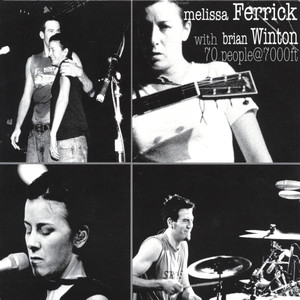
- 歌曲
- 时长
简介
Melissa Ferrick's energy electrifies a room. The emotional honesty of her lyrics and vocal delivery, the disciplined fury of her acoustic guitar, and her close rapport with her listeners have all helped her win over one audience after another with a grace bordering on magic. Whether playing an intimate club or to a crowd of thousands, she comes on fierce but isn't afraid to show her vulnerability at the same time, and that balance keeps fans eager to discover where she'll take them next. Born in 1970, Ferrick spent her formative years in an Ipswich, Massachusetts house dating back to 1650. Her father was a public school teacher and "hidden poet" while her mother worked in retail and ran a home day-care center to help make ends meet. Mr. Ferrick also managed several free-jazz bands on the side, and often brought his 5-year-old daughter to clubs on Boston's North Shore to watch them play. She began violin lessons around the same point, after proclaiming to her dad at age 4 that she'd wanted to play the instrument since before she was born. ("Which was weird, because I don't think I'd ever seen one at that point," she laughs.) By elementary school and junior high, she was learning trumpet and bass. Twelve years of classical training (including 2 each at Berklee College of Music and the New England Conservatory of Music) gave Melissa ample background in music theory, but it wasn't until she picked up a guitar that she truly found her own voice. "I feel like we found each other," she says of her favorite instrument, which she taught herself to play. "I'm constantly discovering different ways I can make sounds come out of it, ways I can make an acoustic guitar not sound like an acoustic guitar." Ferrick started attracting attention from the get-go. By age 20 - thanks in large part to a last-minute replacement gig opening for Morrissey in Boston - she was already signed to Atlantic Records and recording her first two albums. "I got very lucky," Melissa says in retrospect. "I found myself onstage at Madison Square Garden, but I hadn't really paid any dues yet." That would come soon enough, along with a move to the respected indie What Are Records for her next three releases. Leaving her original major-label home "was the best thing that ever could have happened to me, because suddenly I didn't have all those outside things supporting me-the managers and the agents-and I realized I didn't need them. I started to grow up; I learned how to tour, how to make ends meet, how to work records." With so much practical experience under her belt, the next logical step was eliminating the middle man altogether, so in the year 2000 she launched her own label, Right On Records, which to date has released a double live set and the studio albums Valentine Heartache and Listen Hard. (Both available on CD Baby.) "This has been the most amazing experience," she says of being her own boss. "I finally have the freedom as an artist to express myself however I want to, and to put out my work without going through this whole process of people deciding what the single is. Now the only people judging my music are the ones who want to hear it, and then they decide if they like it." Clearly they do, since combined sales of Ferrick's three Right On albums have topped 26,000 without a scrap of corporate backing. Meanwhile, Melissa plays well over 150 dates a year, sometimes solo and sometimes accompanied by drummer Brian Winton, consistently packing such venues as The Bottom Line and The Knitting Factory in Manhattan, New Orleans' House of Blues, and Slim's in San Francisco, as well as universities and summer festivals throughout the U.S. and Canada. Three new projects are already in the works: "70 People at 7000 feet", a new live CD with Winton; a new studio album set to hit stores in May of 2004; and Decade, a DVD document of her first 10 years as a recording artist. Ferrick's audience grows increasingly more diverse in terms of age, gender, and sexual orientation and her fans are as hard to categorize as she is. "I've found a whole new community of people who are hippies, gypsies, and queers," she says, smiling as she recalls young lesbians dancing side by side with Deadheads at her shows. "That's a lot of people, and that's a lot of power."







![SOFTCORE (HARDCORE Edition) [Explicit]](http://y.gtimg.cn/music/photo_new/T002R90x90M0000015wLgu3E8vEB.jpg?max_age=2592000)